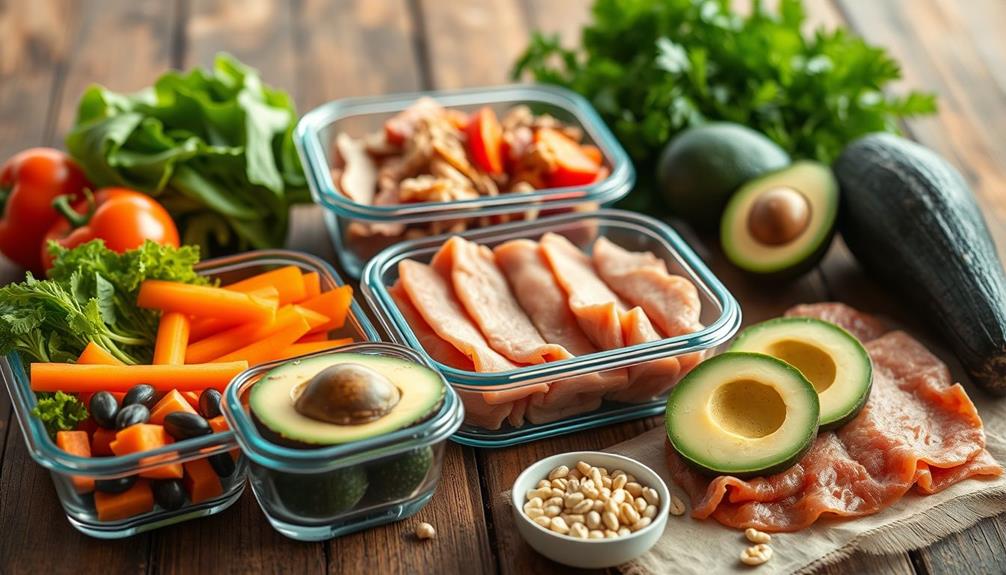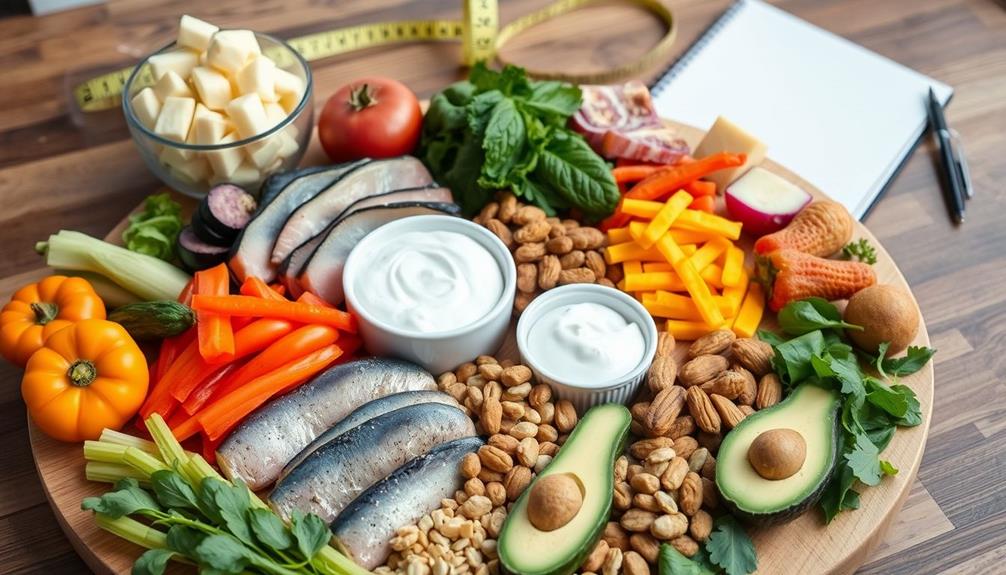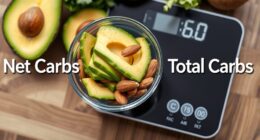Mastering nutrient sufficiency on a keto diet is vital. You need to focus on nutrient-dense foods like leafy greens, low-carb vegetables, high-quality proteins, and healthy fats. This variety not only prevents deficiencies in essential vitamins and minerals but also supports your overall well-being. Strategic meal planning and tracking your nutrient intake can help you stay on top of your goals. Don't forget to take into account supplements like magnesium and potassium to fill any gaps. By being mindful of your nutrient intake, you can thrive on keto and enjoy the benefits that come with it. There's so much more to explore! Achieving ketosis with protein can be a key aspect of a successful keto diet. Balancing your protein intake is important to prevent excess protein from being converted into glucose, which can hinder ketosis. Focus on consuming moderate amounts of protein from sources like fish, poultry, and tofu to support your body’s metabolic state. With the right balance of nutrients and a mindful approach, you can optimize your keto diet for long-term success.
Key Takeaways
- Incorporate a variety of leafy greens and low-carb vegetables to enhance nutrient intake and prevent deficiencies on a keto diet.
- Include high-quality protein sources like poultry, red meat, or plant-based options to ensure adequate amino acid consumption.
- Plan meals strategically to include nutrient-dense foods, promoting variety and balanced nutrition throughout the week.
- Monitor key nutrients such as magnesium, potassium, and fiber using tracking apps to identify and address any gaps.
- Consider supplementation with essential vitamins and minerals like magnesium and potassium to support overall health while following a keto diet.
Understanding the Keto Diet

The keto diet is a popular low-carbohydrate, high-fat dietary approach designed to shift your body's primary energy source from glucose to fat.
By drastically reducing your carb intake and increasing your fat consumption, you encourage your body to enter a metabolic state called ketosis. In this state, your body becomes more efficient at burning fat for energy, which can lead to significant weight loss.
To achieve sustainable weight loss, it's vital to incorporate a balanced diet rich in nutrient-dense foods, such as avocados, nuts, seeds, and fatty fish while avoiding sugary foods and grains.
Many people also report improved energy levels and mental clarity while on this diet.
Ultimately, understanding the keto diet is important for effectively harnessing its potential benefits for your health and wellness.
Importance of Nutritional Sufficiency

Nutritional sufficiency is essential when following a keto diet, as it guarantees you get the important vitamins and minerals your body needs to function at its best.
Without proper nutrient intake, you might face deficiencies that can lead to fatigue, muscle cramps, or even cognitive issues.
It's imperative to eat a variety of nutrient-dense foods to cover your nutritional bases. This means incorporating leafy greens, low-carb vegetables, and quality protein sources into your meals.
Remember, a diverse diet not only supports your overall health but also enhances your keto experience.
Key Foods for Nutrient Density

To achieve ideal nutrient density on a keto diet, focus on incorporating a variety of key foods that not only meet your macronutrient goals but also provide essential vitamins and minerals.
Leafy greens like spinach and kale are excellent low-carb sources of nutrients. Include low-carb vegetables such as broccoli, cauliflower, and zucchini for added fiber and vitamins.
High-quality proteins from poultry, red meat, or plant-based options guarantee you're getting necessary amino acids.
Don't forget healthy fats from avocados, nuts, and seeds, as well as oils like olive and coconut for balanced energy.
This diverse selection helps you avoid deficiencies while keeping your meals satisfying and nutritious, paving the way for successful keto living.
Meal Planning Strategies

Planning your meals strategically can make all the difference in maintaining nutrient sufficiency on a keto diet. Start by mapping out your weekly meals, guaranteeing you include a variety of nutrient-dense foods. Focus on leafy greens, low-carb vegetables, and high-quality protein sources. Incorporate healthy fats from avocados, nuts, and olive oil to enhance flavor and nutrition.
Consider prepping meals in advance to avoid last-minute choices that might lead to nutrient gaps. Track your nutrient intake using apps to stay aware of any deficiencies.
Don't forget to rotate your food options regularly; this diversity helps guarantee you're getting all essential vitamins and minerals. With a solid plan in place, you'll feel more confident in your keto journey.
Common Nutritional Deficiencies

Many people on the keto diet face common nutritional deficiencies if they don't manage their food choices carefully. Without a diverse intake of foods, you might miss out on essential nutrients like folate, biotin, selenium, chromium, magnesium, and potassium.
These deficiencies can occur since many nutrient-rich foods, such as fruits and whole grains, are restricted on keto. You may also lack fiber, vitamin C, and magnesium, which can affect your overall health.
Symptoms like fatigue, muscle cramps, and mood changes can signal these deficiencies. To avoid these issues, guarantee you include a variety of nutrient-dense foods in your meals and be mindful of your dietary choices.
Regularly monitoring your intake can help maintain balance and prevent deficiencies.
Essential Supplements for Keto

Addressing nutritional deficiencies on the keto diet often involves considering the role of supplements. While focusing on whole foods is essential, certain nutrients might still fall short. Here's a quick guide on some essential supplements:
| Supplement | Benefits | Recommended Use |
|---|---|---|
| Folic Acid | Supports cell function and growth | Daily, as needed |
| Magnesium | Alleviates cramps and fatigue | Daily, especially during change |
| Potassium | Aids heart health and fluid balance | Daily, with meals |
| Omega-3 Fatty Acids | Reduces inflammation, boosts cognition | Daily, with meals |
| Multivitamins | Covers various nutrient gaps | Daily, as directed |
Incorporating these supplements can help you maintain nutrient sufficiency and support your overall health on the keto journey.
Tracking Your Nutrient Intake

To maintain ideal nutrient sufficiency on the keto diet, tracking your nutrient intake is vital. By monitoring what you eat, you can identify any gaps in vitamins and minerals that might arise from your low-carb lifestyle.
Using apps like MyFitnessPal or Cronometer makes it easy to log your meals and analyze your nutrient consumption. Pay attention to key nutrients, including magnesium, potassium, and fiber, as deficiencies can lead to unwanted health issues.
Regular tracking helps you adjust your meals to guarantee you're meeting your nutritional needs. Remember, variety is important, so include a wide range of foods in your diet.
Special Considerations for Variations

When exploring variations of the keto diet, such as vegetarian or vegan options, it's important to pay attention to your nutrient sufficiency.
These diets can be nutrient-rich, but without careful planning, you might miss essential vitamins and minerals. Here are some key considerations:
- Focus on plant-based proteins: Incorporate tofu, tempeh, and seitan to meet protein needs.
- Boost omega-3 intake: Use flaxseeds, chia seeds, and walnuts to support heart health.
- Prioritize high-fiber veggies: Include leafy greens and low-carb vegetables for essential nutrients.
- Consider supplementation: A multivitamin or specific supplements may help fill nutrient gaps.
Frequently Asked Questions
Can I Consume Alcohol on a Keto Diet?
Yes, you can consume alcohol on a keto diet, but choose low-carb options like dry wine or spirits. Just be mindful of your overall carb intake, as some drinks can quickly add up.
How Can I Manage Keto Flu Symptoms Effectively?
To manage keto flu symptoms effectively, stay hydrated, replenish electrolytes with foods like avocados and nuts, and consider gentle exercise. Gradually easing into the diet can help your body adapt without severe discomfort.
Is Intermittent Fasting Compatible With the Keto Diet?
"Don't put all your eggs in one basket." Yes, intermittent fasting's compatible with keto. You'll experience enhanced fat burning and mental clarity, but guarantee you maintain nutrient-dense meals to support your overall health during fasting.
What Are the Best Snacks for a Keto Lifestyle?
For a keto lifestyle, choose snacks like cheese, nuts, avocados, and hard-boiled eggs. These options provide healthy fats and protein while keeping your carb intake low, helping you stay satisfied and energized throughout the day.
How Often Should I Check My Ketone Levels?
Checking your ketone levels is like tuning a guitar; you want it just right. Aim for every few days initially, then weekly. This helps you stay in ketosis and adjust your diet as needed.
Conclusion
As you navigate the keto journey, think of nutrient sufficiency as the compass guiding you toward vibrant health. By embracing nutrient-dense foods, planning meals with intention, and staying mindful of potential deficiencies, you'll not only thrive but also transform your well-being. Remember, your body deserves a symphony of nutrients to function at its best. So, tune in to what you eat, and let the benefits of keto resonate through every aspect of your life!









